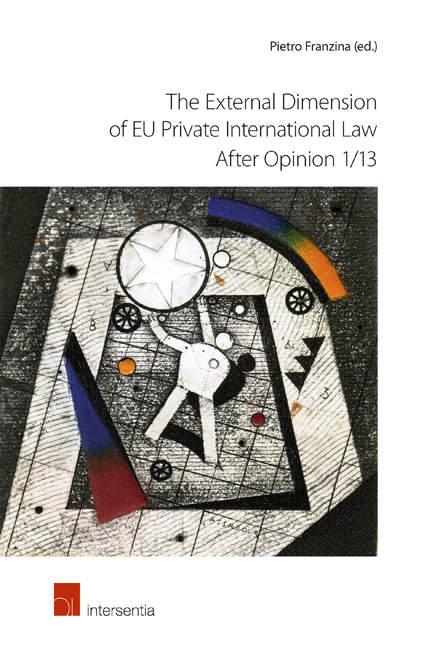Book contents
- Frontmatter
- Preface
- Contents
- PART I THE INTERNATIONAL PROJECTION OF EU PRIVATE INTERNATIONAL LAW - SOME BASIC ISSUES
- PART II OPINION 1/13 AND ITS IMPLICATIONS
- PART III THE CHANGING FEATURES OF EU EXTERNAL RELATIONS IN THE AREA OF PRIVATE INTERNATIONAL LAW
- EU External Relations and Private International Law: Multilateralism, Plurilateralism, Bilateralism, or Unilateralism?
- EU Cooperation in Civil Matters and Multilevel Unification of Private International Law: Some Remarks
- The Lugano Model - Cooperative Enhancement Over Enhanced Cooperation
- Regulations (EC) Nos 662/2009 and 664/2009: Can Exclusivity Be Successfully Reconciled with Flexibility?
- PART IV EU LEGISLATION ON PRIVATE INTERNATIONAL LAW AND EXTRA-EUROPEAN SITUATIONS
Regulations (EC) Nos 662/2009 and 664/2009: Can Exclusivity Be Successfully Reconciled with Flexibility?
from PART III - THE CHANGING FEATURES OF EU EXTERNAL RELATIONS IN THE AREA OF PRIVATE INTERNATIONAL LAW
Published online by Cambridge University Press: 15 December 2017
- Frontmatter
- Preface
- Contents
- PART I THE INTERNATIONAL PROJECTION OF EU PRIVATE INTERNATIONAL LAW - SOME BASIC ISSUES
- PART II OPINION 1/13 AND ITS IMPLICATIONS
- PART III THE CHANGING FEATURES OF EU EXTERNAL RELATIONS IN THE AREA OF PRIVATE INTERNATIONAL LAW
- EU External Relations and Private International Law: Multilateralism, Plurilateralism, Bilateralism, or Unilateralism?
- EU Cooperation in Civil Matters and Multilevel Unification of Private International Law: Some Remarks
- The Lugano Model - Cooperative Enhancement Over Enhanced Cooperation
- Regulations (EC) Nos 662/2009 and 664/2009: Can Exclusivity Be Successfully Reconciled with Flexibility?
- PART IV EU LEGISLATION ON PRIVATE INTERNATIONAL LAW AND EXTRA-EUROPEAN SITUATIONS
Summary
INTRODUCTION
In the past two decades, the Union has made a significant contribution to the area of judicial cooperation in civil matters having cross-border implications. The idea of international cooperation in cross-border civil matters is certainly not new. Already in 1893, the first steps towards such cooperation were taken in the framework of what would later become the Hague Conference on Private International Law. The Hague Conference became a permanent international organisation in 1955. Its objective is to strengthen legal certainty by striving for the progressive harmonisation of the rules of private international law. Besides the Hague Conference, Member States have concluded a web of bilateral agreements to facilitate cooperation in cross-border civil matters.
Until well in the 1990's, the Hague Conference was mainly composed of European states. In the absence of any clear competences of the Union with regard to private international law, it appeared that judicial cooperation in civil matters would take place mainly via the Hague Conference. This changed with the entry into force of the Treaty of Amsterdam. Following the Treaty of Amsterdam, the Union progressively adopted measures aimed at the harmonisation of private international law, while at the same time, the Hague Conference gradually evolved into a truly international organisation. The membership of the Hague Conference has doubled in size since 1997 and its members now include important emerging economies such as Brazil, India, the Russian Federation and South Africa. Moreover, the European Community became, on behalf of the Union, a member of the Hague Conference in 2007. Although the emergence of the Union as an important actor in the area of private international law should be welcomed in principle, it may come at the expense of the ability of the Member States to participate in traditional fora and enter into bilateral agreements with third countries. The risk is that the pursuit of wider international cooperation in cross-border civil matters is substituted for cooperation amongst Member States. This risk has become more real in the light of the broad understanding by the Court of Justice of the European Union (CJEU) of the Union's external competence in private international law.
- Type
- Chapter
- Information
- Publisher: IntersentiaPrint publication year: 2016



